名词从句讲义
- 格式:doc
- 大小:102.00 KB
- 文档页数:9
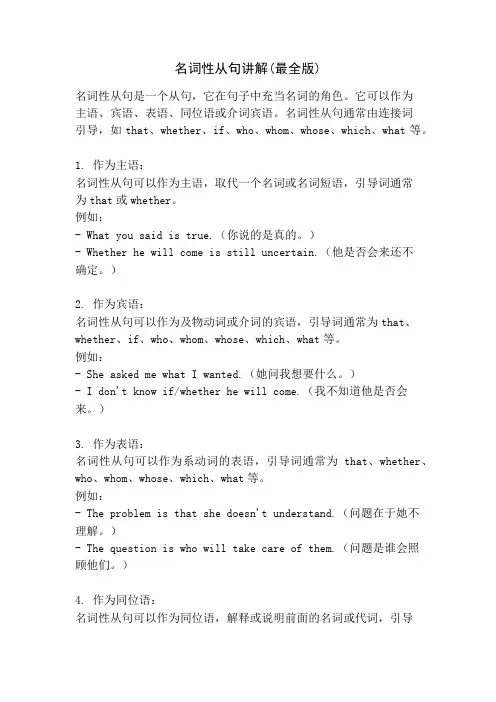
名词性从句讲解(最全版)名词性从句是一个从句,它在句子中充当名词的角色。
它可以作为主语、宾语、表语、同位语或介词宾语。
名词性从句通常由连接词引导,如that、whether、if、who、whom、whose、which、what等。
1. 作为主语:名词性从句可以作为主语,取代一个名词或名词短语,引导词通常为that或whether。
例如:- What you said is true.(你说的是真的。
)- Whether he will come is still uncertain.(他是否会来还不确定。
)2. 作为宾语:名词性从句可以作为及物动词或介词的宾语,引导词通常为that、whether、if、who、whom、whose、which、what等。
例如:- She asked me what I wanted.(她问我想要什么。
)- I don't know if/whether he will come.(我不知道他是否会来。
)3. 作为表语:名词性从句可以作为系动词的表语,引导词通常为that、whether、who、whom、whose、which、what等。
例如:- The problem is that she doesn't understand.(问题在于她不理解。
)- The question is who will take care of them.(问题是谁会照顾他们。
)4. 作为同位语:名词性从句可以作为同位语,解释或说明前面的名词或代词,引导词通常为that、whether、who、whom、whose、which、what等。
例如:- The fact that he lied surprised me.(他撒谎的事实让我感到惊讶。
)- His belief that she will succeed is unwavering.(他坚信她会成功。
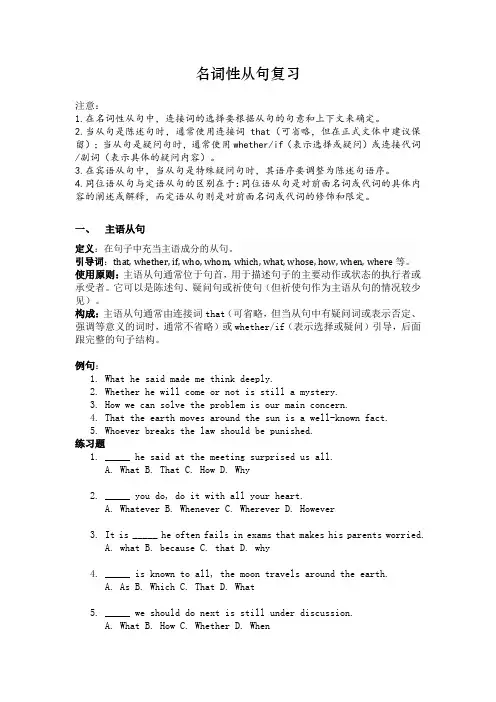
名词性从句复习注意:1.在名词性从句中,连接词的选择要根据从句的句意和上下文来确定。
2.当从句是陈述句时,通常使用连接词that(可省略,但在正式文体中建议保留);当从句是疑问句时,通常使用whether/if(表示选择或疑问)或连接代词/副词(表示具体的疑问内容)。
3.在宾语从句中,当从句是特殊疑问句时,其语序要调整为陈述句语序。
4.同位语从句与定语从句的区别在于:同位语从句是对前面名词或代词的具体内容的阐述或解释,而定语从句则是对前面名词或代词的修饰和限定。
一、主语从句定义:在句子中充当主语成分的从句。
引导词:that, whether, if, who, whom, which, what, whose, how, when, where等。
使用原则:主语从句通常位于句首,用于描述句子的主要动作或状态的执行者或承受者。
它可以是陈述句、疑问句或祈使句(但祈使句作为主语从句的情况较少见)。
构成:主语从句通常由连接词that(可省略,但当从句中有疑问词或表示否定、强调等意义的词时,通常不省略)或whether/if(表示选择或疑问)引导,后面跟完整的句子结构。
例句:1.What he said made me think deeply.2.Whether he will come or not is still a mystery.3.How we can solve the problem is our main concern.4.That the earth moves around the sun is a well-known fact.5.Whoever breaks the law should be punished.练习题1._____ he said at the meeting surprised us all.A. WhatB. ThatC. HowD. Why2._____ you do, do it with all your heart.A. WhateverB. WheneverC. WhereverD. However3.It is _____ he often fails in exams that makes his parents worried.A. whatB. becauseC. thatD. why4._____ is known to all, the moon travels around the earth.A. AsB. WhichC. ThatD. What5._____ we should do next is still under discussion.A. WhatB. HowC. WhetherD. When答案:AAC(强调句结构)AA二、宾语从句定义:在句子中充当宾语成分的从句。
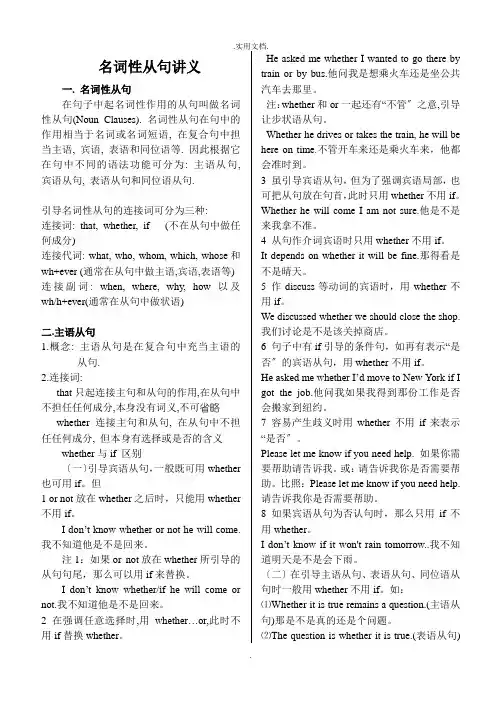
名词性从句讲义一. 名词性从句在句子中起名词性作用的从句叫做名词性从句(Noun Clauses). 名词性从句在句中的作用相当于名词或名词短语, 在复合句中担当主语, 宾语, 表语和同位语等. 因此根据它在句中不同的语法功能可分为: 主语从句, 宾语从句, 表语从句和同位语从句.引导名词性从句的连接词可分为三种:连接词: that, whether, if (不在从句中做任何成分)连接代词: what, who, whom, which, whose和wh+ever (通常在从句中做主语,宾语,表语等) 连接副词: when, where, why, how以及wh/h+ever(通常在从句中做状语)二.主语从句1.概念: 主语从句是在复合句中充当主语的从句.2.连接词:that只起连接主句和从句的作用,在从句中不担任任何成分,本身没有词义,不可省略whether 连接主句和从句, 在从句中不担任任何成分, 但本身有选择或是否的含义whether与if 区别〔一〕引导宾语从句,一般既可用whether 也可用if。
但1 or not放在whether之后时,只能用whether 不用if。
I don’t know whether or not he will come. 我不知道他是不是回来。
注1:如果or not放在whether所引导的从句句尾,那么可以用if来替换。
I don’t know whether/if he will come or not.我不知道他是不是回来。
2 在强调任意选择时,用whether…or,此时不用if替换whether。
He asked me whether I wanted to go there by train or by bus.他问我是想乘火车还是坐公共汽车去那里。
注:whether和or一起还有“不管〞之意,引导让步状语从句。
Whether he drives or takes the train, he will be here on time.不管开车来还是乘火车来,他都会准时到。
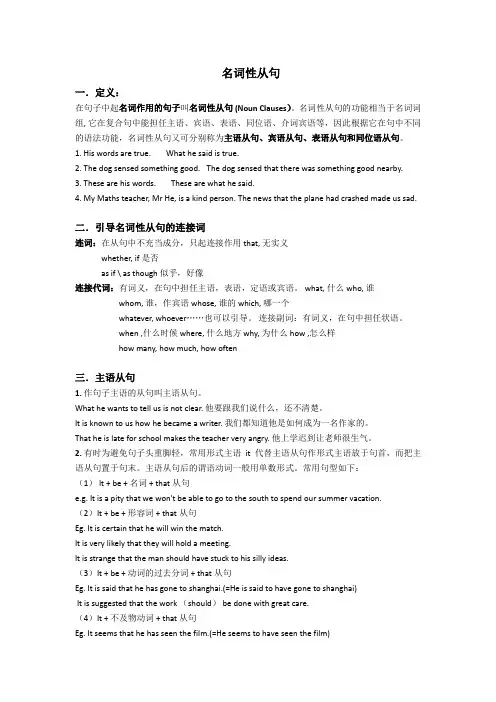
名词性从句一.定义:在句子中起名词作用的句子叫名词性从句 (Noun Clauses)。
名词性从句的功能相当于名词词组, 它在复合句中能担任主语、宾语、表语、同位语、介词宾语等,因此根据它在句中不同的语法功能,名词性从句又可分别称为主语从句、宾语从句、表语从句和同位语从句。
1. His words are true. What he said is true.2. The dog sensed something good. The dog sensed that there was something good nearby.3. These are his words. These are what he said.4. My Maths teacher, Mr He, is a kind person. The news that the plane had crashed made us sad.二.引导名词性从句的连接词连词:在从句中不充当成分,只起连接作用 that, 无实义whether, if 是否as if \ as though 似乎,好像连接代词:有词义,在句中担任主语,表语,定语或宾语。
what, 什么 who, 谁whom, 谁,作宾语 whose, 谁的 which, 哪一个whatever, whoever……也可以引导。
连接副词:有词义,在句中担任状语。
when ,什么时候 where, 什么地方 why, 为什么 how ,怎么样how many, how much, how often三.主语从句1. 作句子主语的从句叫主语从句。
What he wants to tell us is not clear. 他要跟我们说什么,还不清楚。
It is known to us how he became a writer. 我们都知道他是如何成为一名作家的。
That he is late for school makes the teacher very angry. 他上学迟到让老师很生气。
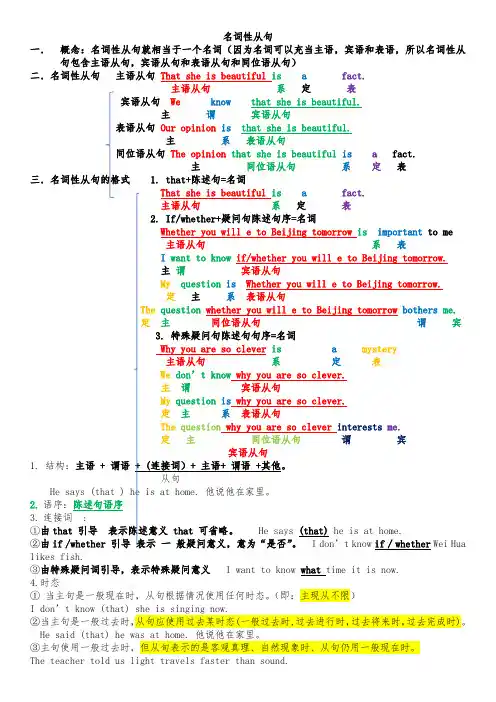
一.概念:名词性从句就相当于一个名词(因为名词可以充当主语,宾语和表语,所以名词性从句包含主语从句,宾语从句和表语从句和同位语从句)二.名词性从句主语从句That she is beautiful is a fact.主语从句系定表宾语从句We know that she is beautiful.主谓宾语从句表语从句 Our opinion is that she is beautiful.主系表语从句同位语从句The opinion that she is beautiful is a fact.主同位语从句系定表三.名词性从句的格式 1. that+陈述句=名词宾1.结构:主语 + 谓语2.语序:陈述句语序3.连接词 :①由that 引导②由if /whether 引导know if / whether Hua likes fish.③由特殊疑问词引导,表示特殊疑问意义 I want to know what time it is now.4.时态①当主句是一般现在时,从句根据情况使用任何时态。
(即:主现从不限)I don’t know (that) she is singing now.②当主句是一般过去时,从句应使用过去某时态(一般过去时,过去进行时,过去将来时,过去完成时)。
He said (that) he was at home. 他说他在家里。
③主句使用一般过去时,但从句表示的是客观真理、自然现象时、从句仍用一般现在时。
The teacher told us light travels faster than sound.一、一般结构:主语+连系动词+表语从句,二、可以接表语从句的词有:①be(being, been, am ,is, are, was, were)(be动词)② feel,look,sound, taste, smell (感官动词)③ stand, lie,remain, keep, stay(保持动词)④bee, get, grow, turn ,go ,prove(变化动词)⑤ seem, appear(表象动词)三、公式:a.由连接词that(无意义), whether(是否)引导的表语从句这时主句的主语常常是抽象名词,如problem, result, chance, suggestion, question, reason 等,表语从句对主句主语进行说明,解释等。
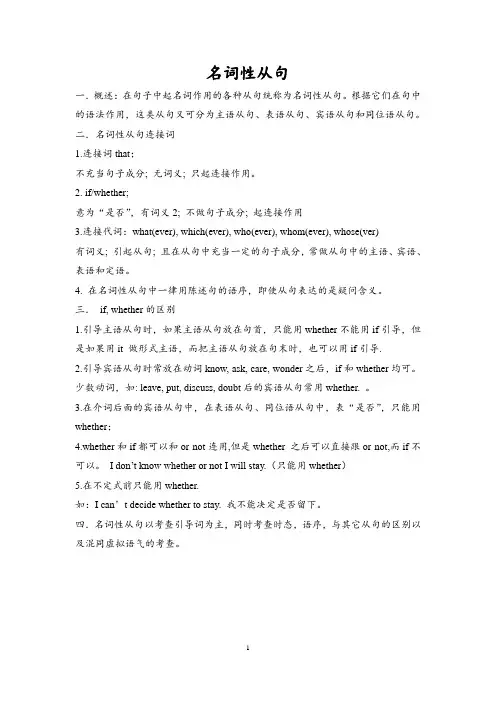
名词性从句一.概述:在句子中起名词作用的各种从句统称为名词性从句。
根据它们在句中的语法作用,这类从句又可分为主语从句、表语从句、宾语从句和同位语从句。
二.名词性从句连接词1.连接词that;不充当句子成分; 无词义; 只起连接作用。
2. if/whether;意为“是否”,有词义2; 不做句子成分; 起连接作用3.连接代词:what(ever), which(ever), who(ever), whom(ever), whose(ver)有词义; 引起从句; 且在从句中充当一定的句子成分,常做从句中的主语、宾语、表语和定语。
4. 在名词性从句中一律用陈述句的语序,即使从句表达的是疑问含义。
三.if, whether的区别1.引导主语从句时,如果主语从句放在句首,只能用whether不能用if引导,但是如果用it 做形式主语,而把主语从句放在句末时,也可以用if引导.2.引导宾语从句时常放在动词know, ask, care, wonder之后,if和whether均可。
少数动词,如: leave, put, discuss, doubt后的宾语从句常用whether. 。
3.在介词后面的宾语从句中,在表语从句、同位语从句中,表“是否”,只能用whether;4.whether和if都可以和or not连用,但是whether 之后可以直接跟or not,而if不可以。
I don’t know whether or not I will stay.(只能用whether)5.在不定式前只能用whether.如:I can’t decide whether to stay. 我不能决定是否留下。
四.名词性从句以考查引导词为主,同时考查时态,语序,与其它从句的区别以及混同虚拟语气的考查。
一.主语从句1.主语从句定义:在复合句中充当主语的句子叫做主语从句。
That he will succeed is certain.Whether wild life can be well protected is of great importance.Who will go makes no different.Which kind of food is the best is still not certain.What is needed for the space trip is careful preparation.Whoever comes is welcome.How we can help the twins will be discussed at the meeting.When they’ll start the project has not been decided yet.Where he hid the money is to be found out.Why dinosaurs died out remains a puzzle.单个主语从句作主语时,谓语动词用单数形式。
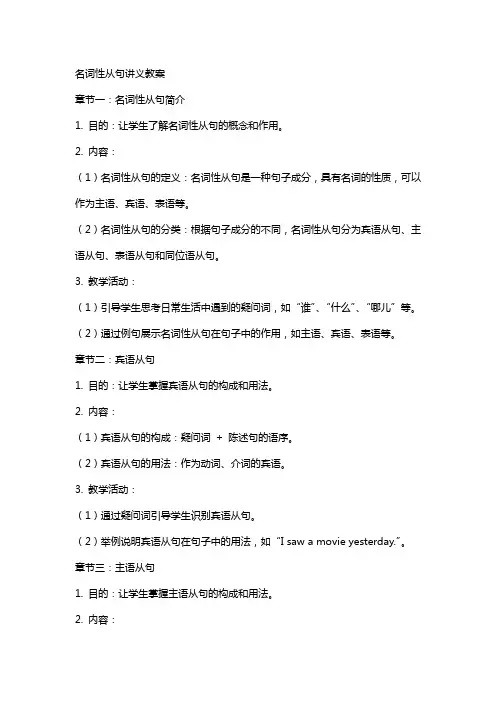
名词性从句讲义教案章节一:名词性从句简介1. 目的:让学生了解名词性从句的概念和作用。
2. 内容:(1)名词性从句的定义:名词性从句是一种句子成分,具有名词的性质,可以作为主语、宾语、表语等。
(2)名词性从句的分类:根据句子成分的不同,名词性从句分为宾语从句、主语从句、表语从句和同位语从句。
3. 教学活动:(1)引导学生思考日常生活中遇到的疑问词,如“谁”、“什么”、“哪儿”等。
(2)通过例句展示名词性从句在句子中的作用,如主语、宾语、表语等。
章节二:宾语从句1. 目的:让学生掌握宾语从句的构成和用法。
2. 内容:(1)宾语从句的构成:疑问词+ 陈述句的语序。
(2)宾语从句的用法:作为动词、介词的宾语。
3. 教学活动:(1)通过疑问词引导学生识别宾语从句。
(2)举例说明宾语从句在句子中的用法,如“I saw a movie yesterday.”。
章节三:主语从句1. 目的:让学生掌握主语从句的构成和用法。
2. 内容:(1)主语从句的构成:疑问词+ 陈述句的语序。
(2)主语从句的用法:作为主语,表示话题或陈述对象。
3. 教学活动:(1)通过疑问词引导学生识别主语从句。
(2)举例说明主语从句在句子中的用法,如“That she is ing is good news.”。
章节四:表语从句1. 目的:让学生掌握表语从句的构成和用法。
2. 内容:(1)表语从句的构成:疑问词+ 陈述句的语序。
(2)表语从句的用法:作为表语,补充说明主语的内容。
3. 教学活动:(1)通过疑问词引导学生识别表语从句。
(2)举例说明表语从句在句子中的用法,如“The problem is that we don't have enough time.”。
章节五:同位语从句1. 目的:让学生掌握同位语从句的构成和用法。
2. 内容:(1)同位语从句的构成:疑问词+ 陈述句的语序。
(2)同位语从句的用法:与前面的名词或代词共同作主语、宾语或表语,起到解释说明的作用。
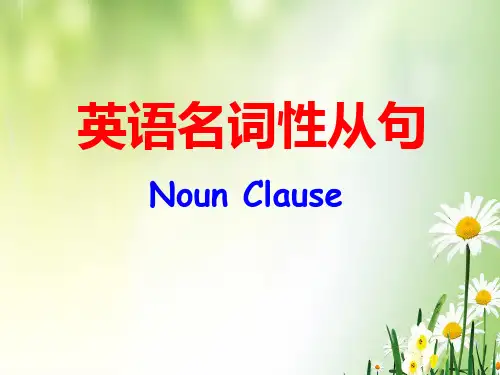
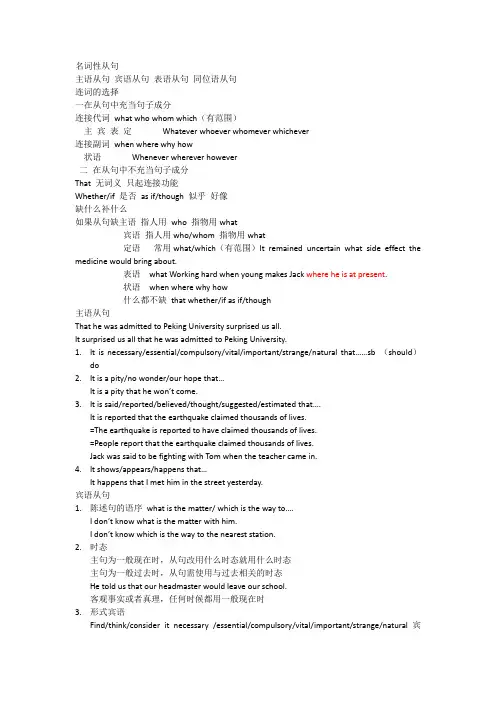
名词性从句主语从句宾语从句表语从句同位语从句连词的选择一在从句中充当句子成分连接代词what who whom which(有范围)主宾表定Whatever whoever whomever whichever连接副词when where why how状语Whenever wherever however二在从句中不充当句子成分That 无词义只起连接功能Whether/if 是否as if/though 似乎好像缺什么补什么如果从句缺主语指人用who 指物用what宾语指人用who/whom 指物用what定语常用what/which(有范围)It remained uncertain what side effect the medicine would bring about.表语what Working hard when young makes Jack where he is at present.状语when where why how什么都不缺that whether/if as if/though主语从句That he was admitted to Peking University surprised us all.It surprised us all that he was admitted to Peking University.1.It is necessary/essential/compulsory/vital/important/strange/natural that……sb (should)do2.It is a pity/no wonder/our hope that…It is a pity that he won’t come.3.It is said/reported/believed/thought/suggested/estimated that….It is reported that the earthquake claimed thousands of lives.=The earthquake is reported to have claimed thousands of lives.=People report that the earthquake claimed thousands of lives.Jack was said to be fighting with Tom when the teacher came in.4.It shows/appears/happens that…It happens that I met him in the street yesterday.宾语从句1.陈述句的语序what is the matter/ which is the way to….I don’t know what is the matter with him.I don’t know which is the way to the nearest station.2.时态主句为一般现在时,从句改用什么时态就用什么时态主句为一般过去时,从句需使用与过去相关的时态He told us that our headmaster would leave our school.客观事实或者真理,任何时候都用一般现在时3.形式宾语Find/think/consider it necessary /essential/compulsory/vital/important/strange/natural 宾语从句Make it clear thatWe find it necessary that we should learn English well.Dislike/hate/like it when….I dislike it when people ask me when to get married.Appreciate it if…I will appreciate it if you invite me to dinner.See to it that (注意)You should see to it that our kids are taken good care of while we are away.Depend on it that (相信) You should depend on it that I will love you forever.4.介词后一般不接以that连接的宾语从句,除了in that(由于)和except thatThis article is good in general except that there are some grammar mistakes in it.I was absent from school due to the fact that I was ill. I was absent from school for the reasonthat I was ill.表语从句The reason (why…..) is that…The reason why I was absent from school is that I was ill.The reason that he gave us for his absence from school is that he was ill.It/that/this is because….I was absent from school. That is because I was ill.I was absent from school, which is because I was ill.That is why….I was ill. That is why I was absent from school.I was ill, which is why I was absent from school.That is where I disagree/you have mistakes/ I have doubts/ the problem lies/I compromise.----- The rent of our flat will see a rise of 20 percent this year?------Yes. That is where I have compromised with the flat owner.Cherishing what you have is where the key to happiness lies.同位语从句接在抽象名词“fact,view,evidence,suggestion,word,news,idea,possibility,question, doubt, problem”等后,对其解释说明He put forward a suggestion that we should have an assistant.The suggestion that he put forward at the meeting was that we should have an assistant.She is in doubt whether the policy will be put into practice.There is no doubt that he will come.The question when we will begin our winter vacation hasn’t been decided yet.分隔现象Word came that the epidemic broke out in Wuhan.Evidence came up that specific speech sounds can be recognized by babies as early as six months old.名词性从句中的其它问题一、主语从句作主语时,谓语动词单复数1.单个的主语从句作主语时,谓语动词用单数2.两个主语从句作主语时,谓语动词用复数3.两个并列的连词连接同一个主语从句时,谓语动词用单数When the meeting will be held hasn’t been decided yet.When the meeting will be held and who will attend the meeting haven’t been decided yet.When and where the meeting will be held hasn’t been decided yet.What we need is some food.What we need are some books.二、that 的省略1. 主语从句、表语从句以及同位语从句中that 不省略2. 介词后的宾语从句中that 不可省略3. 带有形式宾语it 的宾语从句中that 不可省略4. 一个句子中有两个并列的宾语从句时,第一个that可以省略,第二个that 不可以省略He insisted (that)he didn’t commit the crime and that he should be set free.三、whether/if1. 主语从句、表语从句以及同位语从句中只用whether不用if,it作形式主语的主语从句中亦可以用ifDoes it matter much if he won’t come?2. 介词后的宾语从句中只用whether 不用if3. 宾语从句前置时,只用whether不用ifWhether he will come, I don’t know.4.Whether…or not5.Whether to do6.从句是否定句时I don’t know if he won’t come.四、doubt肯定句否定句动词Whether/if That名词Whether ThatWhatever the reason (is), you shouldn’t be late for school.=No matter what the reason is, you shouldn’t be late for school.Parents are willing to be devoted to whatever it takes to educate their children.Who will attend the meeting hasn’t been announced.Whoever will attend the meeting will be given a chance to deliver a speech.Whoever attends the meeting, he will be given a chance to deliver a speech.六、在名词性从句中表示某一个类别或职业的人时,一般不用who而用whatHe is what is known as ‘bellyacher’----he is always complaining about things around him.名词性从句专项练习基础练习一、在空格处填上恰当的连词,每空限填一词1. It has been proved eating vegetables in childhood helps to protect you againstserious illness in later life.2. It is not immediately clear the financial crisis will soon be over.3. ---We've only got this small bookcase. Will that do?---No, I am looking for is something much bigger and stronger.4. As his best friend, I can make accurate guesses about he will do or think.5. As a new diplomat, he often thinks of he can react more appropriately on such occasions.6. The message you intend to convey through words may be the exact opposite of others actually understand.7. One reason for her preference for city life is she can have easy access to places like shops and restaurants.8. The possibility the majority of the labor force will work at home is often discussed.9. There is much truth in the idea kindness is usually served by frankness.10. Doris' success lies in the fact she is co-operative and eager to learn from others.11. Nobody believed his reason for being absent from class he had to meet his uncle at the airport.12. I think that this meal was well worth was charged for it.13. Little Tommy was reluctant to tell the schoolmaster he had done the day before.14. is still unknown when the president will make a public speech.15. By improving reading skills you can read faster and understand more of you read.16. Choosing the right dictionary depends on you want to use it for.17. The traditional view is we seep because our brain is “programmed” to make us do so.18. Why not try your luck downtown, Bob? That's the best jobs are.19. It is no longer a question now man can land on the moon.20. Could I speak to is in charge of International Sales, please?21. There is clear evidence the most difficult feeling of all to interpret is bodily pain.22. It was not until dark that he found he thought was the correct way to solve the problem.23. When changing lanes, a driver should use his turning signal to let other drivers know lane he is entering.24. It has not been decided she will be promoted to general manager.25. water can be used to produce electricity is true.26. he referred to in his article was unknown to the general reader.27. The dealer told me how much he was prepared to pay for my car and I could have the money without delay.28. Mary wrote an article on the team had failed to win the game.29. His ability has never been in doubt the question is he is prepared to work hard.30. After five hours' drive, they reached they thought was the place they'd been dreaming of.31. Many people firmly believed a healthy lifestyle can improve the quality of life.32. has an interest in the lecture can go for a ticket from the office next to the gate of the lecture room.33. Despite the rule mobile phones are forbidden in class, my deskmate can't help playing phone games occasionally.34. The question came up at the meeting we had enough money for our research.35. close parents are to their children has a strong influence on the character of the children.36. Young adults generally make their own choices about career they will pursue.37. His suggestion put forward at the conference the UN launch an educational program to teach people how to solve conflicts peacefully will be taken into consideration.38. It happened once, however, some seventy years ago, the gold cup was stolen a few days before the race.39. Sorry, I am late, but you cannot imagine great trouble I took to find your house.40. The teacher left word with our monitor she would explain the problem again next time.41. golf was first played in Scotland in the 15th century is generally agreed.42. When I try to understand it is that prevents so many Americans from being as happy as one might expect, it seems to me that there are two causes.43. Contrary to the opinion of the members, the president should appoint he thinks can do the job most adequately.44. The figures are further evidence children are more likely to become near-sighted.45. Perseverance is a kind of quality and that's it takes to do anything well.46. parents say and do usually has a life-long effect on their children.47. President Barack Obama told ABC news he was aware of the development of the recent investigation.48. Of course, the fact misguided forms of dieting result in so many problems does not mean that no dieting is safe.49. You didn't study for your test, so your teacher has a point about you failed!50. As a leader, he never says no to all his group members think is right.提高练习一、在空格处填上恰当的连词,每空限填一词1. We haven't discussed yet we are going to place our new furniture.2. Part of the reason why Charles Dickens loved his own novel, David Copperfield, was it was rather closely modeled on his own life.3. How much one enjoys himself travelling depends largely on he goes with,whether his friends or relatives.4. She is very dear to us. We have been prepared to do it takes to save her life.5. The fact has worried many scientists the earth it becoming warmer and warmer these years.6. We should consider the students’ request the school library provide more books on popular science.7. Many young people in the west are expected to leave could be life's most important decision---marriage---almost entirely up to luck.8. The little girl who got lost decided to remain she was and wait for her mother.9. The last time we had great fun was we were visiting the Water Park.10. Mary wrote an article on the team had failed to win the game.11. Elephants have their own way to tell the shape of an object and it is rough or smooth.12. In spite of has recently been done to provide more buses for people, a shortage of public vehicles in some areas remains a serious problem.13. What he emphasized over and over again was , no matter how difficult it might be, they should never retreat even for an inch.14. Scientists study human brains work to make computers.15. As many as five courses are provided, and you are free to choose suits you best.16. We promise attends the party a chance to have a photo taken with the movie star.17.It is still under discussion the old bus station should be replaced with a modern hotel.18. Our teachers always tell us to believe in we do and who we are if we want to succeed.19. Modern science has given clear evidence smoking can lead to many diseases.20. I have no idea the journalist could have got his information from.21. He was asked among all the stories he had read was the most interesting.22. They buried themselves in their studies in the belief they would serve their country with their knowledge.23. After seemed to be a long time, the singer appeared on the stage, facing the excited audience.24. It was never clear the man hadn't reported the accident sooner.25. His writing is so confusing that it is difficult to make out it is that he is trying to express.26. Word got round quickly throughout the country the national women's volleyball team had won the championship in the Olympic Games.27. The limits of a person's intelligence, generally speaking, are fixed at birth, but he reaches these limits will depend on his environment.28. It makes no difference we'll share the office with.29. When the news came the war broke out, he decided, to serve in the army.30. It is not easy for the public to see use a new invention can be of to human life.31. Believe it or not, I'm not interested in they will listen to my excuse.32. Nowadays, you'll notice a phenomenon a lot of people are wearing jeans to concerts.33. Online education forces colleges to focus on the rest of the learning processes, which isthe real value lies.34. their only son is behaving worse and worse these days worries the couple a lot.35. People may forget what you said or what you did, but they will never forget you made them feel.36. she was at the time of the murder was a major concern to the police that are investigating the case.37.AIl this work is supposed to be finished before this Friday, and the trouble is we are short of hands.38. It goes without saying that breaks the rule will be fired.39.He is ill after months' of hard work. This is he was absent from the ceremony yesterday.40. The movement research is based on the idea music and the human nervous system have deep, biological connections.41. This newly-invented robot now can only do you have instructed it to do.42. It is still not clear they will have enough fund to carry out the new project.43. There is a rule in our club no one is allowed to smoke in this meeting room.44. is still unknown when the president is going to make a public speech.45. We can easily get from the computer has been stored in it.46. she will be able to beat her opponents and win the first prize in the contest is still a mystery.47. Nobody believed his reason for being absent from the class he had to meet his uncle at the airport.48. Having your own apartment means that you can decorate it in style you like.49. What I can't understand is she is so interested in such matters.50. He happened to arrive at later proved an isolated island.。
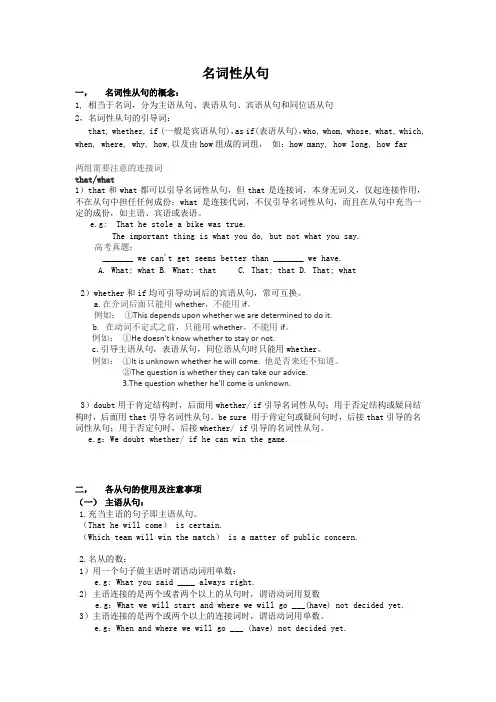
名词性从句一,名词性从句的概念:1, 相当于名词,分为主语从句、表语从句、宾语从句和同位语从句2,名词性从句的引导词:that, whether, if (一般是宾语从句),as if(表语从句),who, whom, whose, what, which, when, where, why, how,以及由how组成的词组,如:how many, how long, how far两组需要注意的连接词that/what1)that和what都可以引导名词性从句,但that是连接词,本身无词义,仅起连接作用,不在从句中担任任何成份;what是连接代词,不仅引导名词性从句,而且在从句中充当一定的成份,如主语、宾语或表语。
e.g: That he stole a bike was true.The important thing is what you do, but not what you say.高考真题:_______ we can't get seems better than _______ we have.A. What; whatB. What; thatC. That; thatD. That; what2)whether和if均可引导动词后的宾语从句,常可互换。
a.在介词后面只能用whether,不能用if。
例如:①This depends upon whether we are determined to do it.b.在动词不定式之前,只能用whether,不能用if。
例如:①He doesn't know whether to stay or not.c.引导主语从句,表语从句,同位语从句时只能用whether。
例如:①It is unknown whether he will come. 他是否来还不知道。
②The question is whether they can take our advice.3.The question whether he'll come is unknown.3)doubt用于肯定结构时,后面用whether/ if引导名词性从句;用于否定结构或疑问结构时,后面用that引导名词性从句。
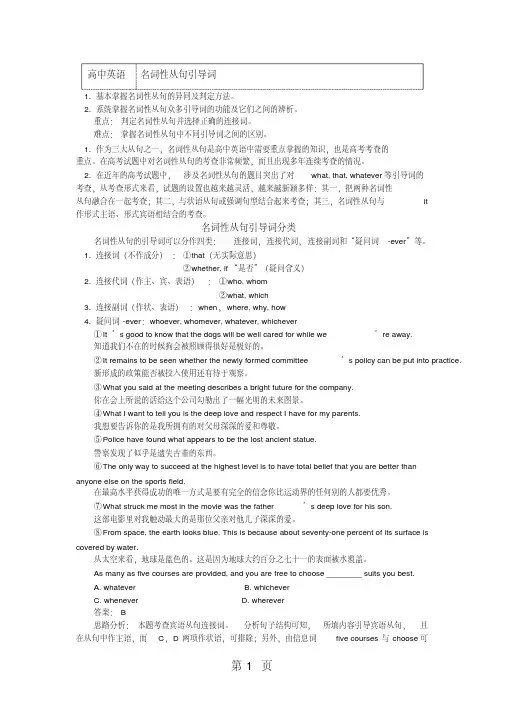
高中英语名词性从句引导词1. 基本掌握名词性从句的异同及判定方法。
2. 系统掌握名词性从句众多引导词的功能及它们之间的辨析。
重点:判定名词性从句并选择正确的连接词。
难点:掌握名词性从句中不同引导词之间的区别。
1. 作为三大从句之一,名词性从句是高中英语中需要重点掌握的知识,也是高考考查的重点。
在高考试题中对名词性从句的考查非常频繁,而且出现多年连续考查的情况。
2. 在近年的高考试题中,涉及名词性从句的题目突出了对what, that, whatever等引导词的考查,从考查形式来看,试题的设置也越来越灵活,越来越新颖多样:其一,把两种名词性从句融合在一起考查;其二,与状语从句或强调句型结合起来考查;其三,名词性从句与it作形式主语、形式宾语相结合的考查。
名词性从句引导词分类名词性从句的引导词可以分作四类:连接词,连接代词,连接副词和“疑问词-ever”等。
1. 连接词(不作成分):①that(无实际意思)②whether, if“是否”(疑问含义)2. 连接代词(作主、宾、表语):①who, whom②what, which3. 连接副词(作状、表语):when,where, why, how4. 疑问词-ever:whoever, whomever, whatever, whichever①It’s good to know that the dogs will be well cared for while we’re away.知道我们不在的时候狗会被照顾得很好是极好的。
②It remains to be seen whether the newly formed committee’s policy can be put into practice.新形成的政策能否被投入使用还有待于观察。
③What you said at the meeting describes a bright future for the company.你在会上所说的话给这个公司勾勒出了一幅光明的未来图景。
高考英语语法复习名词性从句讲解练习名词性从句是指在复合句中起名词作用的句子,功能相当于名词词组。
名词性从句在复合句中能作主语、宾语、表语、同位语等,根据在句中的语法功能可分为主语从句、宾语从句、表语从句和同位语从句。
一、主语从句【定义】在复合句中,作主语的句子称为主语从句。
【常见的连接词】(连接词在句中不能省略)that, whether, who, what, whatever, whoever, where, when, why, how等。
【用法】连接词 that 引导That we should learn English well is very important.主语从句中 we should learn English well句子完整,不缺成分,用that引导,that 不能省连接词whether,if 引导whether 引导的主语从句可放句首,也可放句中,表“是否”if 引导的主语从句只能引导动词后的宾语Whether I will go or not depend on the weather.It remains to be seen whether / if they can finish the task in time.2.连接代词what, who, which, whose, whatever, whichever,whoever等引导What matters most is your attitude.3.连接副词when,where,why,how等引导How he made it is still unknown.4.it作形式主语为了避免句子头重脚轻,通常把形式主语it放在句首,真正的主语放在句子后面。
常见句型:(1) It is + n.+ that + 句子It is +(a pity / a shame / a fact …)+ that ...(2) It is + adj.+ that + 句子It is +(true / clear / important …)+ that ...(3) It is + 过去分词 + that + 句子It is+ said / announced / expected / believed / hoped… + that ...(4) It seems /appears / happens / turned out that + 句子(5) It hit sb./occurred to sb.that + 句子二、宾语从句【定义】在复合句中,作宾语的句子称为宾语从句。
语法系列专题名词性从句一、名词性从句1.概念:在主从复合句中,相当于名词的从句被称为名词性从句。
2.分类:名词性从句包括:主语从句、宾语从句、表语从句和同位语从句。
二、宾语从句1在复合句中作动词或介词宾语的从句叫作宾语从句。
He said (that) you were too young to understand the matter and that you were asked not to care about it.She told me that she would accept my invitation.连接代词和连接副词引导的宾语从句连接代词who,whom,whose,what,which,whatever,whoever,whomever,whichever和连接副词when,where,how,why。
这些连接词都有词义,除引导从句外,还在从句中充当一定的成分,可作主语、宾语、表语、定语、状语等。
这种宾语从句有疑问意义,但不是疑问句,不能用疑问语序,而要用陈述语序。
She always thinks of how she can work well.她总是在想怎样把工作做好。
(how作状语)She gave up what she was doing.她放弃了她正在做的事情。
(what作宾语)Do you know who has won Red Alert game?你知道是谁赢得了红色警戒的游戏吗?(who作主语)Do you know when the meeting will begin?你知道什么时候开会吗?(when作状语)Can I speak to whoever is in charge of this project?我能和负责这个项目的人谈谈吗?(whoever作主语)it作形式宾语当某些动词后的宾语从句之后有宾语补足语(通常是形容词或名词)时,通常以it 代替that宾语从句作形式宾语,这时that不可省略。
名词性从句名词性从句:在句子中起名词作用的句子叫名词性从句(Noun Clauses)。
名词性从句在复合句中能担任:主语、宾语、表语、同位语等。
名词性从句分为:主语从句、宾语从句、表语从句和同位语从句。
一、引导名词性从句的连接词名词性从句的引导词可分为三类:1、从属连词(5个)(1)that无词义,在从句中不做成分(表明从句的确定性),在宾语从句或表语从句中that有时可以省略(2)whether, if有词义,在从句中不做成分(whether, if均表示“是否”之意,表明从句内容的不确定性) 不可以省略(3)as if, as though (均表示“好像”,“似乎”之意)在从句中不做成分2、连接代词(9 个):what, whatever, who, whoever, whom, whomever, whose, which, whichever,有词义,在从句中做成分,不可以省略(who what which在从句中做主语、宾语、其中what指代没有范围的事物, which指代有范围的事物,表“选择哪一个"whom做宾语whose做定语)3、连接副词(7 个):when, where, how, why, whenever, wherever, however 有词义,在从句中做状语,不用以省略二、主语从句主语从句:作主语的从句叫主语从句。
考点一、主语从句引导词that:无词义,在主语从句中不做成分,不可省略That he dislikes the movie is none of my business.1.whether:翻译为“是否”,在从句中不做成分,不可省略1)Whether he will come is unknown.2)Whether spending money to enhance employees,working skills is the most crucial investment that has been debatedheavily among managers.3)由连接代词what, who, whom, which, whoever, whatever, whichever, whose 等引导的主语从句,连接代词需要在从句中做主语或者宾语,不可省略。
第四章名词性从句学习目标1.掌握名词性从句的概念和分类,并能识别出名词性从句2.掌握主语从句的连接词、语序、时态的用法3.掌握表语从句的连接词、语序、时态的用法4.能熟练理解名词性从句的含义并能进行长难句分析识记一、名词性从句概念及分类名词性从句是指在句子中相当于名词作用的从句,通常充当主句的主语、宾语、表语等成分。
名词性从句主要包括__________从句、__________从句、__________从句和__________从句。
e.g.That the boy failed again in the exam disappointed his mother. (__________从句)I know that he is writing his composition in his room. (__________从句)The question is how we can finish it on time. (__________从句)The fact that some Chinese are still poor is really a great problem. (__________从句)二、名词性从句连接词一、主语从句位于句首,常用____做形式主语e.g. That he will come and help you is certain. (that不充当从句内的任何成分,____省略)Whether there is life on the moon is an interesting question. (whether不充当从句内的任何成分,不能用____)What he wants to tell us is not clear. (what充当从句内的_____)Who will win the match is still unknown. (who充当从句内的_____)Where the English evening will be held has not yet been announced.(where充当从句内的_____语)Whatever he said was right. (whatever充当从句内的_______)It is known to us how he became a writer. (it为形式主语,代替how引导的____从句)【主语从句要点拓展】1. it做形式主语的结构(1) It’s a pity/ a shame/ an honor/ a fact/ no wonder/ common sense/ good news that… 遗憾的是(荣耀的是、事实是、难怪是、常识是,好消息是……)e.g. It is a pity that you didn’t attend the lecture yesterday.(2) It’s clear/right/true/certain/necessary/(un)likely/important/(im)possible/obvious/remarkablethat… ……很清楚(正确,必要,重要,可能,值得注意等)e.g. It is likely that there will be a snowstorm tomorrow.(3) It is well-known/reported/recorded/estimated/said/believed that…众所周知(据报道,据记载,据估计,据说,据人们相信)…e.g. It is said that his father left him nothing.(4) It turns out/seems/appears/happens/matters…) that…结果是……(似乎是, 碰巧是, 重要的是……)e.g. It happened (to me) that I had been away when he called.2. it做形式主语与it is(was)… that…强调句式的区分e.g. It is a pity that you didn’t go to see the film.It is in the morning that the murder took place.解题方法:将it is/was… that 去掉,看余下部分是否完整,若完整即为强调句式;反之为it作形式主语。
名词性从句讲解在复合句中起名词作用的从句叫做名词性从句。
它包括主语从句、宾语从句、表语从句和同位语从句。
名词性从句是中学阶段的一个重要语法项目,在历年的高考中几乎都涉及到,并且每年的命题各有变化。
分析历届高考试题名词性从句考查的焦点主要有以下六个方面1. 考查名词性从句的语序问题2. 考查引导词that与what的区别3. 考查it在名词性从句中作形式主语或形式宾语的用法4. 考查whether与if的区别5. 考查名词性从句中的疑问词+ever引导的名词性从句与no matter+疑问词引导的状语从句的区别6. 考查名词性从句的虚拟语气问题(一)语法要点剖析一、名词性从句主语从句、表语从句、宾语从句、同位语从句,在整个句子中所起的作用,相当于一个名词。
因此,这四种从句通称为名词性从句。
引导名词性从句的连接词可分为三类:连接词:that, whether, if (不充当从句的任何成分)连接代词:what, whatever, who, whoever, whom, whose, which.连接副词:when, where, how, why1. 主语从句作句子主语的从句叫主语从句。
主语从句通常由从属连词that,whether,if和连接代词what,who,which,whatever,whoever以及连接副词how,when,where,why等词引导。
that 在句中无词义,只起连接作用;连接代词和连接副词在句中既保留自己的疑问含义、又起连接作用,在从句中充当从句的成分。
例如:What he wants to tell us is not clear. 他要跟我们说什么,还不清楚。
It is known to us how he became a writer. 我们都知道他是如何成为一名作家的。
Where the English evening will be held has not yet been announced.英语晚会将在哪里举行,还没有宣布。
第四讲名词性从句一、知识点拨(一)宾语从句(Object Clause)同学们在初中阶段时就开始接触宾语从句了。
当将一个直接引语转为间接引语时,就是在构造一个与“说”相关的动词后的宾语从句了。
在直接引语向间接引语转化的过程中,应就不同的句型类别进行不同的处理。
而不同的句型类别都应根据转述者和转述时间对宾语从句中的人称、时态及状语作相应的调整。
1.陈述句: 不需调整语序,只要对人称,时态或状语作一定的变化即可。
通常,若主句中的动词为过去时,则从句中的时态也要相应后退一格。
但如从句部分是客观真理,时态则务须变化。
如:①When the fox could not reach the grapes, he said, “The grapes are sour.”→ When the fox could not reach the grapes, he said that the grapes were sour.②She said, “Necessity is the mother of invention”→She said that necessity is the mother of invention.2.疑问句:可分为一般疑问句和特殊疑问句两类。
⑴一般疑问句: 转为if 或whether(是否)引导的宾语从句,且调整为陈述句语序,即主谓宾的顺序。
有时可用或whether … or not的结构。
如:“Do you want to insure your luggage or not?” he asked.⑵但当疑问词即是句子中的主语,则无需变换语序。
如:①“How are you getting along with your English study?” asked John.→ John asked me how I was getting along with my English study.②He asked, “What caused the accident?” → He asked what had caused the accident.3.祈使句: 可不再转为宾语从句,而是用“命令性动词+ 人称代词(宾格)/名词+ 不定式”的结构来表达相近的意思。
如:I said, “Keep a record of your expenses.”→4.”的结构。
如:She exclaimed, “What a silly boy you are!”→She told him what a silly boy he was.5.特殊结构:可根据句子的意思作灵活的变通。
如:①“You had better not leave your car unlocked,” said my friends, “there has been a lot ofstealing from cars.”→ My friends warned me not to leave my car unlocked as there had been a lot of stealing from cars.②British poet P.B.Shelly said, “If winter comes, can spring be far behind?”→British poet P.B.Shelly said that spring can’t be far behind if winter came.掌握了与“说”相关的动词后的宾语从句的构成,其它动词后的宾语从句也就不难理解了。
须注意两类动词:1. 表示说话者认知的动词:know, believe, think, explain, guess, hope, agree, understand, realize,suppose, expect 等动词后既可以跟that 引导的陈述分句作宾语,that常被省略;又可以跟疑问分句。
如:①One should know what’s what.② A straw shows which way the wind blows.值得注意的是:⑴有些表示猜想的动词后的从句中的否定式通常前移至主句中。
如:I don’t think he can do it better than me.⑵反意疑问句通常是对复合句中的主句发问,但若主句为I think/believe/suppose时, 则对从句发问。
如:We never thought she would play so well in the match, had we?I think you’ll come to the meeting, won’t you?⑶回答对think,believe,guess,hope等词提问的一般疑问句时,可用缩略式,即肯定回答用so;否定回答用not或don’t …so。
其中hope的否定回答只能用not。
如:Do you think / hope / guess / believe he will treat the child like that?Yes, I think / hope / guess / believe so.= Yes, I think / hope / guess / believe (that) he will treat the child like that.No, I don’t think / believe / suppose so.= No, I don’t think / believe / suppose (that) he will treat the child like that.No, I hope / believe / guess not.= No, I hope / believe / guess (that) he will treat the child like that.⑷wonder (想知道), doubt (怀疑)等动词本身带有不确定性,故后面多跟疑问分句。
注意,doubt在肯定句中,后接if或whether引导的宾语从句;在否定句和疑问句中后接that引导的宾语从句。
如:①I wonder who he is.②I doubt if / whether she is so vain and ignorant.I don’t doubt (that) she is so vain and ignorant.2. 表达说话者强烈意愿的动词:其后所跟的宾语从句须用虚拟语气。
⑴suggest,advise,order,demand,insist等动词后用“(that) … should do …”的结构,此时should可被省去。
如:Let us suggest to the person in crisis that he (should) cease concentrating so upon the dangers involved and the difficulties, and concentrate instead upon the opportunity- for there is always opportunity in crisis.⑵动词wish后的宾语从句多为不可能实现的愿望,故常将时态后退一格以示虚拟。
如:①I wish that all men everywhere could be free.②I wish she had taken my advice.3.⑴有些动词后带有宾语从句作为其直接宾语,同时带有一个人称代词或名词作为其间接宾语。
如:①He has informed me when they are to discuss my proposal.②She promised us that she would give us more help later on.③The company explained to their employees that a pay rise was out of the question.⑵在含有复合宾语“动词+ 宾语从句+ 宾语补足语”的结构中,往往因为宾语从句过长而将其放到句末,同时用it来充当形式宾语。
如:①We consider it absolutely necessary that we should open our door to the outside world.②I find it strange that he has not come yet.③He has made it clear that he won’t agree to the plan..④I heard it said that she had gone abroad.1.that引导的宾语从句一般不能直接跟在介词后面。
但须注意的是:⑴介词except,but,in后面可跟that引导的宾语从句。
如:①He is a capable man except that he has not enough experience.②I would come to see you but that I had something urgent to do then.③The higher income tax is harmful in that it may discourage people from trying to earnmore.⑵在有些含有介词的短语后可加上形式宾语it,再跟上that引导的宾语从句,形成depend on it that,rely on it that,insist on it that,see to it that等结构。
如:①I shall see to it that he is taken good care of when you are absent.②You can depend on it that I will try my best to get good grades at school.2.wh-词引导的宾语从句可以充当介词的宾语。
如:①We were astonished by what they found.②I walked over to where she sat.③I’m concerned about whether he has signed the contract or not.④I’m interested in when he did it.形容词后的名词性从句也被称作形容词补足语,多用于certain, sure, unaware, glad, afraid, frightened, happy, pleased, sad, sorry, surprised, upset 等表示认知或情感的形容词后。